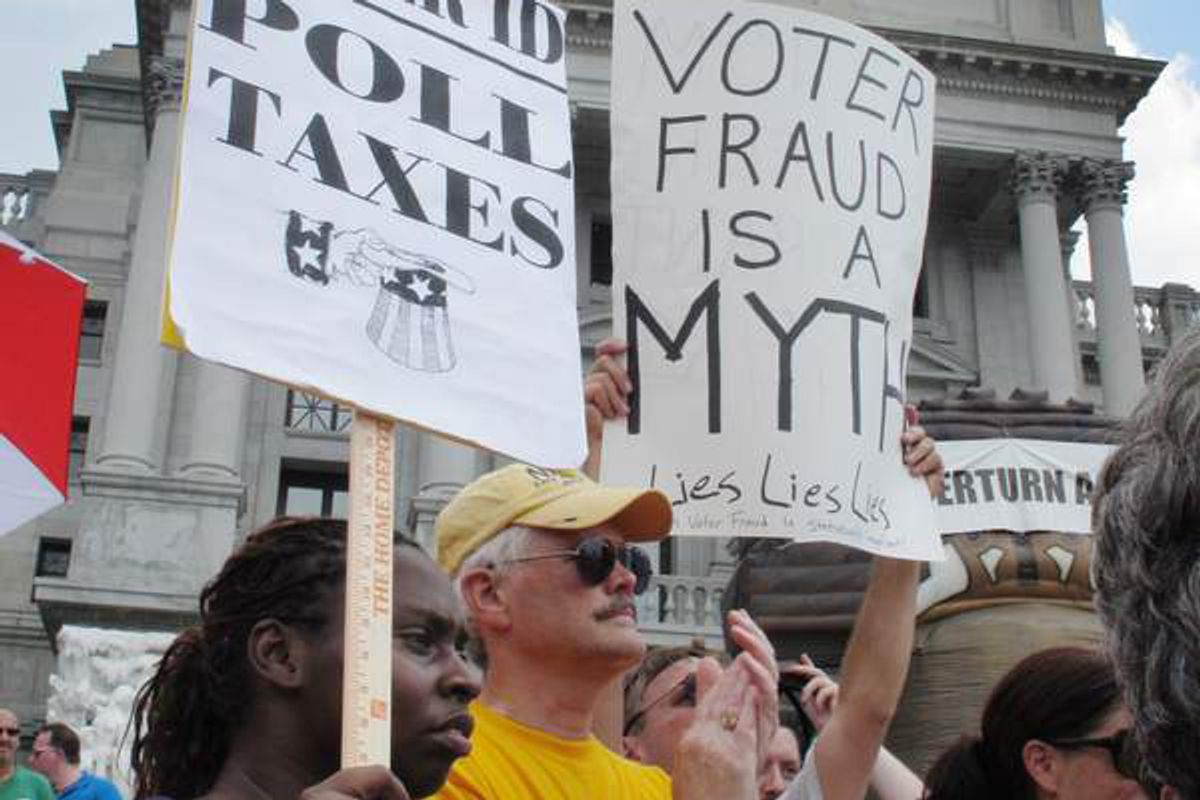If preventing voter ID laws was Plan A, and overturning them was Plan B, then voting rights advocates in many states are moving on to Plan C: acceptance.
On Wednesday, a Pennsylvania judge refused to halt the state's voter ID law, which could disenfranchise 758,000 registered voters. Barring a Supreme Court about-face or a blue-shift in state legislatures, voter ID laws are here to stay. Courts will block them in some states, as they have done in Wisconsin, and a Democratic president’s Justice Department will continue to stop them from taking effect in states that are subject to the Voting Rights Act, as they have done in South Carolina and Texas. But in states where there is little recourse in the courts and a slim chance of overturning the laws in the near future, voting rights advocates are putting contingency plans into place to mitigate the number of citizens disenfranchised because of voter ID laws.
From Kansas to Tennessee to Pennsylvania and beyond, a new effort is popping up: the voter identification drive. Modeled after voter registration drives, where groups help underserved populations get registered to vote, voter identification drives help ensure that citizens get proper photo IDs so they’re not turned away from the polls when they go to vote. Led by independent groups like the NAACP, as well as innovative elected officials and tireless individuals, voter identification drives will likely be increasingly common in states with voter ID.
Adjusting to life under voter ID won’t be easy for Gloria Sweet-Love, president of the Tennessee NAACP. Nearly 700,000 Tennesseans lack photo ID, including a disproportionate number of African-Americans. Helping turn out voters, a primary goal of the NAACP since its inception, was hard enough already, Sweet-Love explained to Salon. But that task grew even more difficult after Tennessee elected a Republican Legislature and governor in 2010 for the first time since the Reconstruction Era and voter ID became law the following year. Though unable to stop or overturn the law, the NAACP took grass-roots action instead. Sweet-Love has helped organize church vans and other volunteers across the state to “work with senior citizens in high-rises and areas that don’t have access to public transportation” and drive them to get voter IDs at the DMV. A similar effort is being made in Kansas where the NAACP held its first-ever voter identification drive on Martin Luther King Jr. Day this year and will continue such campaigns going forward.
It isn’t just voting rights groups that are behind the new wave of voter identification drives. Elected officials are getting in on the effort as well. One such leader is Douglas County (Kansas) clerk Jamie Shew, a Democrat in charge of elections in the Lawrence area. Because the wait at the DMV can take hours and many people aren’t even able to get there in the first place, Shew set out to find a way to make it easier for his constituents to comply with the new law. “I don’t want voter ID to be an impediment to them voting,” Shew told Salon.
His solution: Instead of bringing people to the ID agencies, bring ID agencies to the people. Beginning last month, Shew and others in his office began traveling, digital camera in hand, to places where many people lack driver's licenses, such as nursing homes and disability groups. For folks who can’t get to the DMV, Shew snaps their picture, takes down their information, and then prints their voter ID card back in the office before hand-delivering or mailing it to the voter. Douglas County is the first in Kansas to undertake an effort of this kind, but Shew was pleased with the results — “we average a one-day turnaround for each ID” — and it could soon serve as a model for the rest of the state.
Even some private citizens are taking it upon themselves to help voters get photo IDs before November. Brenda Williams, an indefatigable South Carolinian, has been crisscrossing the state to help voters comply with the state’s new voter ID law. Though the Department of Justice blocked the law in August 2011 because of its discriminatory impact on minorities, its fate is currently being decided in the U.S. District Court for the District of Columbia and it could ultimately be allowed to stand. Because of this threat, Williams and her nonprofit Family Unity Inc. are working tirelessly to help Palmetto State residents obtain photo IDs. The AARP noted that this one-woman ID-getting machine has spent “hundreds of hours at her computer, thousands of her own dollars and countless late nights,” helping her fellow citizens get proper identification, “and she has a waiting list.”
Voter identification drives like these are far from a panacea. More than 3 million people lack photo ID in states that have passed voter ID laws, as do more than 20 million people nationwide. Reaching each person through grass-roots effort is impossible; there will still be huge swaths of Americans turned away from the polls on Nov. 6 because they lack a certain form of photo identification.
But in states like Kansas, Tennessee and others where voter ID isn’t going anywhere, it’s up to voting rights organizations to adapt. The NAACP and other advocacy groups, along with innovative individuals, are doing their best to cope with the new playing field. With millions of citizens at risk of being disenfranchised, voter identification drives could play a key role in diminishing the number of individuals who find themselves turned away from the ballot box in November.



Shares